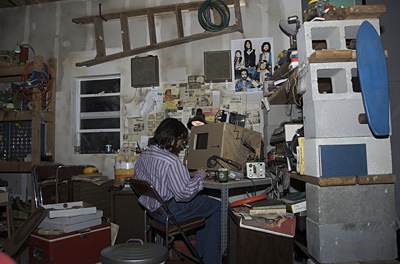Archive for the ‘Technology’ Category
The man is a legend. First Steve Wozniak was immortalized in Lego, now he has been cloned in cogs at Disney’s Epcot Center.
Seen here working on what looks like some kind of wooden Mac, the King of the Geeks presides over a messy garage workshop on the refurbished Spaceship Earth ride.
Alternatively, it could actually be Steve Jobs under that beard and hair. Who knows?
Maybe Disney opted to save money by combining both Steve Wozniak and Steve Jobs into an unholy Jobswiak Monster?
For approximately 4 minutes you get to watch and listen to a Canadian (Steve Smith a.k.a. Red Green) take you through a tour of the 3M plant and learn the magic behind duct tape.
Be sure to pay close attention to the things the guy says while giving the tour. There are some great nuggets to be heard for sure:
After watching the video, I truly believe this guy is “in love” with duct tape.
Did you catch how he touches and caresses all the elements that go into making duct tape? Creepy for sure.
Posted by //
Sean
Date //
Nov 26, 07 - 8:46 am
Categories //
Gaming
Music
Technology
Comments Off on Wireless Guitar Hero III Guitars Coming
Activision has finally announced that they will be releasing standalone wireless controllers for all four versions of Guitar Hero III early next year.
Bit of a bummer that they couldn’t get it together for the holidays, but I’m sure they won’t mind if you choose to pick up a full bundle of the game instead of waiting.
Posted by //
Sean
Date //
Nov 20, 07 - 8:14 am
Categories //
Gaming
Microsoft
Technology
Xbox 360
Comments Off on Ten Free Xbox 360 Arcade Games
Microsoft is offering an impressive little bribe to European 360 owners to get them to persuade their pals to follow the way of the console, too: ten free Xbox Live Arcade games.
The pal with the new console gets the free games, too, thanks to Microsoft’s “refer a friend” promotion, which runs until December 14th.
The freebies are:
- Every Extend Extra Extreme
- Sonic The Hedgehog
- Street Fighter II Hyper Fighting
- Bomberman Live
- Marble Blast Ultra
- Spyglass Boardgames
- 3D Mini Golf Adventures
- Small Arms
- Assault Heroes
- Zuma Deluxe
Uno and Worms, two of the Arcade’s most-played titles, are notably not included.
The relative age of most of the titles makes it likely that the existing 360 owner will only scoop up a few new games, but for someone just buying a 360, this is a huge bonus.
If the Nintendo Wii turns out to be as hard to get as predicted, casual players just might be tempted to go the Microsoft route instead.
Source: Next Generation
Posted by //
Sean
Date //
Nov 19, 07 - 9:31 pm
Categories //
Google
Search
Technology
Comments Off on Google Pirate – Time To Plunder
Doing some research on Pirates this evening, I stumbled upon an interesting gem of a website called Google Pirate.
The concept behind the site? Use the power of Google to scour every corner of the internet for exactly what you need:
I got a fever! And the only prescription.. is more cowbell!
This is definitely a useful website for many reasons… but before you fear (the reaper) getting your “Arrr” on, take a look at the legal disclaimer from the Google Pirate website:
This website is completely compliant with the DMCA. Before you send off emails, be aware that this site has a legal use and does not condone copyright infringement or intellectual theft in any way. This website does not contain any illegal material, nor does it even contain direct links to illegal material. It is designed using Google’s Custom Search tools to narrow search results down to filetypes to remove unwanted sites that aren’t related to the client’s search.
This website is not affiliated with Google. “Google” is a trademarked name of Google Inc. “Google Pirate” is not a trademark name/url and is only named such due to the relevancy of the word Google.
The use of the word “Pirate” does not imply that we condone piracy. Its simply because we think pirates are awesome.
I completely agree, Pirates are awesome and in times like this, I remember the words of Bruce Dickinson:
“Easy, guys… I put my pants on just like the rest of you – one leg at a time. Except, once my pants are on, I make gold records.”
I’m telling you – you’re gonna want that cowbell on the track! Babies.. before we’re done here.. y’all be wearing gold-plated diapers.
What does that mean you’re asking yourself? Never question Bruce Dickinson! Roll it!
In Memoriam: Gene Frenkle: 1950-2000
Posted by //
Sean
Date //
Nov 13, 07 - 5:43 am
Categories //
Geekery
Technology
Trivia
Comments Off on Old-School Hacker Timeline
Before the word “hacker” was wrongly associated with vandalistic script kiddies and mischievous virus writers, it was used to describe an underground culture.
This underground culture was made up of professional engineers and basement tinkerers obsessed with improving computer technology through unconventional, simple, yet brilliant tricks.
Out of this early 1960s hacker culture grew an offshoot of technological anarchists, otherwise ordinary nerds with an irrepressible desire to provoke and prod the establishment. Their exploits made them hacker gods and in some cases unexpected inmates.
1878: Young male switchboard operators at Bell telephone purposefully misdirect phone calls and listen in on the hilarious results. Bell only hires female operators from henceforth.
1961: MIT’s Tech Model Railroad Club receives its first PDP-1 computer, which it adopts as its toy of choice. The early members of the TMRC evolve a culture and slang all their own.
It’s at MIT that the term “hacker” is believed to have been born. TMRC understood hacking as inventing a quick, elegant fix for a complex problem without damaging or affecting the greater system.
1969: Dennis Ritchie and Ken Thompson at Bell Labs create the crowning achievement of ’60s-style positive hacking: Unix.
The new operating system allows many different programmers to access a computer’s resources at the same time. Unix also works on different, competing computer platforms, which are plentiful in 1969.
The US Department of Defense develops ARPANET (now the Defense Advance Research Projects Agency), the first high-speed computer network connecting universities, research laboratories, and defense contractors.
For the first time, disparate hacker groups from MIT, Stanford, Carnegie Mellon, and elsewhere can mingle and collaborate over a transcontinental network. The result is a deepening of hacker culture, lingo, and lifestyle.
- Read the Jargon File, the definitive hacker document from the ARPANET days.
 1971: John Draper, aka Cap’n Crunch, discovers that the free whistle given away in Cap’n Crunch cereal boxes can be used to gain free access to phone networks.
1971: John Draper, aka Cap’n Crunch, discovers that the free whistle given away in Cap’n Crunch cereal boxes can be used to gain free access to phone networks.
The whistle produces a perfect 2,600-MHz tone, the exact audio wavelength needed to fool the phone company’s multifrequency system into giving him a free dial tone. The practice becomes known as “phone phreaking” or just “phreaking.”
- Read the original article on phreaking from Esquire Magazine, October 1971.
- Read Cap’n Crunch’s reaction to the article.
 1971-1972: Berkeley engineering students Steve Wozniak, Steve Jobs, and Bill Klaxton contact Draper and ask to learn the ways of the blue box, the small, electronic tone device Draper invented to phreak phone networks.
1971-1972: Berkeley engineering students Steve Wozniak, Steve Jobs, and Bill Klaxton contact Draper and ask to learn the ways of the blue box, the small, electronic tone device Draper invented to phreak phone networks.
Always the prankster, Wozniak’s first phreaked call is to the pope. Against Draper’s advice, Wozniak builds some blue boxes of his own and sells them for $150 a pop.
Some of the money earned from this illegal scheme is used to fund one of Wozniak’s side projects with Jobs, a personal computing venture that would become Apple Computer.
- Read Draper’s account of his first meeting with Woz.
May 1972: Draper is arrested for phone phreaking and sentenced to four months in California’s Lompoc prison, where he teaches fellow inmates the ins and outs of hacking Ma Bell.
- Read Draper’s account of his Lompoc hacking classes.
1980: Usenet is born, networking Unix machines over slow phone lines. Usenet eventually overruns ARPANET as the virtual bulletin board of choice for the emerging hacker nation.
1982: As hacker culture begins to erode, losing some of its brightest minds to commercial PC and software start-ups, Richard Stallman starts to develop a free clone of Unix, written in C, that he calls GNU (for “Gnu’s Not Unix”).
The purest strains of old-school hackerdom are believed to survive in Stallman’s free software movement.
- Author Steven Levy chronicles the evolution of “the hacker ethic” in his groundbreaking book, Hackers: Heroes of the Computer Revolution.
1983: The movie WarGames launches a popular — if misconstrued — image of hackers headfirst into the mainstream media. Amateur interest in hacking explodes.
It’s around this same time that the term “hacking” begins to be widely applied to criminal computer behavior, confusing the original meaning of hacking forever.

